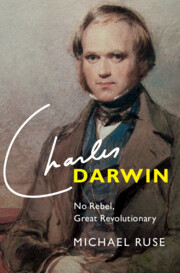Book contents
- Charles Darwin
- Frontispiece
- Charles Darwin
- Copyright page
- Dedication
- Contents
- Figures
- Acknowledgments
- Introduction
- 1 Beginnings
- 2 Charles Robert Darwin
- 3 The Origin of Species
- 4 Evolution in the Nineteenth Century
- 5 Evolution in the Twentieth Century
- 6 Normal Science
- 7 Philosophy
- 8 Religion
- 9 Literature
- 10 Social Issues
- Epilogue
- References
- Index
Introduction
Published online by Cambridge University Press: 05 December 2024
- Charles Darwin
- Frontispiece
- Charles Darwin
- Copyright page
- Dedication
- Contents
- Figures
- Acknowledgments
- Introduction
- 1 Beginnings
- 2 Charles Robert Darwin
- 3 The Origin of Species
- 4 Evolution in the Nineteenth Century
- 5 Evolution in the Twentieth Century
- 6 Normal Science
- 7 Philosophy
- 8 Religion
- 9 Literature
- 10 Social Issues
- Epilogue
- References
- Index
Summary
This work is a history of ideas, not a history of science. It uses the past to answer the questions of whether the Darwinian Revolution comes from ideas already prevalent in Victoria society – or is it a work of rebellion? – and whether the Darwinian Revolution was truly revolutionary – or is this a mistaken judgment made by historians and others?
Information
- Type
- Chapter
- Information
- Charles DarwinNo Rebel, Great Revolutionary, pp. 1 - 3Publisher: Cambridge University PressPrint publication year: 2024
